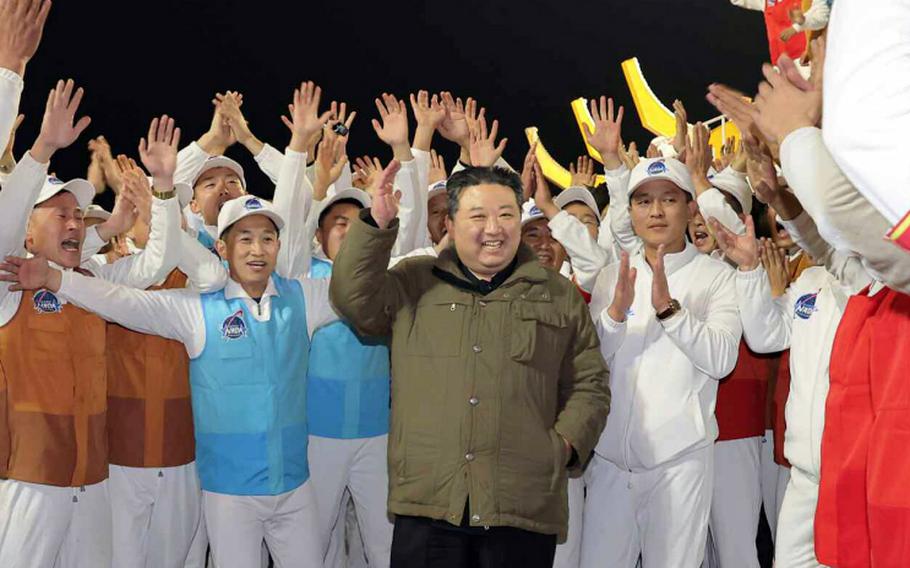Asia-Pacific
Kim Jong Un labels South Korea the North’s ‘principal enemy’
Stars and Stripes January 10, 2024

North Korean leader Kim Jong Un celebrates a rocket launch in this image released by the state-run Korean Central News Agency on Nov. 22, 2023. (KCNA)
CAMP HUMPHREYS, South Korea — North Korean leader Kim Jong Un has named South Korea his country’s “principal enemy” and the nation “most hostile” to Pyongyang, state media reported Wednesday.
Kim made the comments while touring munitions factories earlier this week, according to the Korean Central News Agency.
His comments followed North Korean artillery barrages along the country’s disputed western sea boundary Friday and Sunday. The North denied firing rounds on Saturday, as South Korea claimed. The South’s military responded by firing its own artillery from sea islands it claims.
Kim said his nation will bolster “military capabilities for self-defense and the nuclear war deterrent,” according to the news agency.
“The historic time has come at last when we should define as a state most hostile … the entity called [South Korea],” Kim said, according to the report.
Kim felt great satisfaction over the fact that the arms factories had “successfully carried out the plan for deploying new types of weapons and equipment to the first-line large combined units and major missile units,” the report said.
National Security Council spokesman John Kirby on Tuesday said Russia bombarded the Ukrainian city of Kharkiv on Sunday with missiles provided by North Korea.
Last week, the White House released U.S. intelligence reports that said Russia also fired missiles supplied by North Korea at targets in Ukraine on Dec. 30 and Jan. 2.
Diplomats from 48 countries including South Korea, the U.S., Japan and the European Union, in a joint statement Tuesday said they “condemn in the strongest possible terms” North Korean missile exports and the use of those weapons by Russia against Ukraine.
South Korea’s Unification Ministry, in a statement Wednesday, said “Pyongyang’s insistence on warlike preparations” is a sign that the North is afraid of and impatient over the strengthening of deterrence by the South and the U.S.”
North Korea has tried to escalate tensions on the Korean Peninsula since New Year’s Day, the statement said.
Pyongyang’s “rash acts are an obsolete strategy to try to escape its internal crisis by turning dissatisfaction with the regime outward and to shake the South Korean community,” the statement said.
Previously, North Korea referred to the U.S. as its primary enemy, a Unification Ministry spokeswoman told Stars and Stripes by text message Wednesday. South Korean government officials often speak to the media on condition of anonymity.
A KCNA report on a Jan. 9, 2021, for example, referred to America as the North’s “biggest main enemy,” the spokeswoman said.
Kim’s statement this week underscores the lack of an engagement policy from South Korea now toward the North, Kim Hyun Wook, an American studies professor at Korea National Diplomatic Academy in Seoul, said by email Wednesday.
“Current South Korean policy is focused on military deterrence measures vis-a-vis the North, which made the North to focus on military hawkish policy too,” he said.
The North’s move to label South Korea its primary foe is no major change, according to James Brown, an international affairs expert at Temple University’s Japan campus.
“South Korea undoubtedly is the principal enemy of the North,” he said in an email Wednesday. “The two sides never formally concluded the Korean War and each claims the other’s territory.”
There was, however, less confrontational language during the term of former South Korean President Moon Jae-In, Brown said.
Moon’s successor, Yoon Suk Yeol, who took office last year, has brought his country closer to the U.S. and Japan — fellow democracies threatened by the North.
“Now that Yoon is in power, the rhetorical restraint has been released,” Brown said.